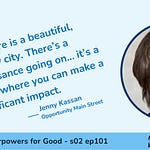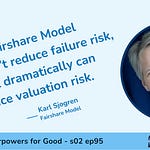Devin: What do you think of as your superpower?
Eddy: So my superpower is actually two different ones. My superpower is not in the small business. I want to scale things up. The second thing that is my superpower is I am very intentional about cultivating deep and meaningful relationships.
Eddy Badrina, the CEO of Eden Green, which employs innovative lighting strategies for vertical farming, shared the story of how its founders launched it:
They're brothers from South Africa, Jack and Eugene, and they're on my staff. One's a CTO and one's the CIO.
They were living in Johannesburg and were feeding in their neighborhood, just passing candy out, had a bounce house going, and they ran across this kid, a five-year-old boy who was stuffing his pockets with candy and they said, “Hey, slow down. Right, there's more that'll go around. You don't need to hoard.”
They asked his teacher, “Hey, what's his scenario? What's the situation? Why is he doing this?”
The teacher said, “Well, it's actually not for him. It's for his three year old sister back home. It's her day to eat and not his.”
So one, the fact that she had to pick a day to eat and two, that he was giving candy as the meal was really something that struck a chord in them.
For most people, it strikes a chord and they feel bad about it and then they go on with their day. Well, these two guys just went into their garage and started trying to create what would become our patented technology.
The innovation is to use as much sunlight as possible while planting vertically.
In a typical greenhouse that relies entirely on sunlight, the plants grow in flat trays. This is more productive per acre than raising crops outside a greenhouse but not as productive as vertical farming.
Most vertical farmers stack plant trays like bunk beds approaching the ceiling. There are lights on every layer. Even with the most efficient lighting available, the cost to power the lights is high.
Vertical farmers are experts at controlling the daily light intake or DLI.
“If you don’t have to use that electricity, it becomes much more financially sustainable. Then the environmental impact is much more sound,” Eddy says.
He explains the Eden Green magic:
We basically have huge walls of greens, and those walls consist of individual towers. And those towers consist of 36 plant spots per tower. Those walls, if you put them, call it six feet apart, it lets the sunlight in. Whatever DLI doesn't get at the bottom, we have actually patented a patented light technology that allows us to have supplemental LED lights shine upon those lower rows.
But it is more than just lighting.
We can grow five ounce plants at the very bottom all at the same time, all getting as much nutrients as they want, the right humidity, temperature level, water temperature, CO2 levels, all controlled per plant spot. That's really where the technology resides. We've created what we call a microclimate around each individual plant spot to control for all those growing factors, which include obviously sunlight.
With their system, he says, they can measure a temperature on a hot Texas afternoon in August of up to 130 degrees at the top of the greenhouse. At the same time, the micro-climate around the plant is an optimal 75 or 76 degrees.
“You’re only environmentally conditioning one-fifth of the entire cubic volume of that greenhouse,” Eddy says. “Thus, it is very, very efficient.”
Vertical, urban farming has excellent potential in significant subsets of agriculture. You’ll never raise cattle there. Grains are not cost-competitive grown vertically. But leafy greens may be more efficiently grown vertically, closer to consumers than in fields.
Sounding like the CEO he is, Eddy says, “The total addressable market of leafy greens alone here in the United States is $12 billion, growing 10 to 15 percent year over year.”
In growing this business, Eddy leverages his superpowers, including a focus on scaling business and building deep and meaningful relationships. Below, I’ll explore the lessons he shared about building relationships.
How to Develop Building Relationships As a Superpower for Good
Before becoming CEO of Eden Green, with a partner, Eddy launched and ran BuzzShift, a digital growth agency for mid-sized brands and organizations. They scaled and sold the business twice, buying back from the first buyer between sales. He credits the success in large part to his relationship with his partner.
“I attribute almost all of that to my relationship with my business partner and then to the fact that I focused on the relationships in the careers of the folks around me more than I focused on my own,” he says.
“Everyone in them has this sort of innate superpower to have really special relationships,” Eddy says. “It doesn’t have to be a lot, but it can be two or three really deep, deep relationships that will carry you through the good times and the bad, and we’ll carry them through the good times and the bad.”
Eddy is deliberate about building relationships.
First, he suggests working to build relationships with people who are older and have wisdom to share—mentors. “That can be as simple as saying, ‘Hey, I would love to spend one hour with you a month. That’s all I’m asking. And then, if it’s worth your time and if you want impact, can I bring to bring along two friends?’”
He explains that by bringing along friends, you can have follow-up sessions as peers to discuss further what you learned from your mentor.
Next, he suggests building strong peer relationships. This would naturally include the peers in your mentoring group.
Eddy sees significant value in peer relationships. “Those are going to give you honest feedback. You should invite that.”
He’s cultivated dozens of peer relationships on a meaningful level. Some care deeply about his business, “others don’t give a rip.” Your life isn’t just business; friends help you get through it all.
You can develop deep and meaningful relationships by following Eddy’s example and advice, giving you a superpower to do more good in the world.
















Share this post